InStep bike trailers are popular and affordable. They also have thousands of reviews on Amazon with a 4.5 star rating! But should you trust those Amazon stars? Are InStep bike trailers actually a good ride?
We’ve tested almost every bike trailer from every major brand out there. While some brands are known for comfort features or some for precision design, InStep bike trailers are best known for an affordable price tag and basic features. With small tires on plastic rims and budget-quality construction, these trailers are best for occasional use, rather than for families that plan on using a bike trailer frequently.
Read our InStep Bike Trailer Review below to see if these basic features will suit your needs, or if you should spend more money on a more expensive bicycle trailer. You can find our top picks for kids bike trailers by reviewing our 10 Best Bike Trailers for Kids Guide.
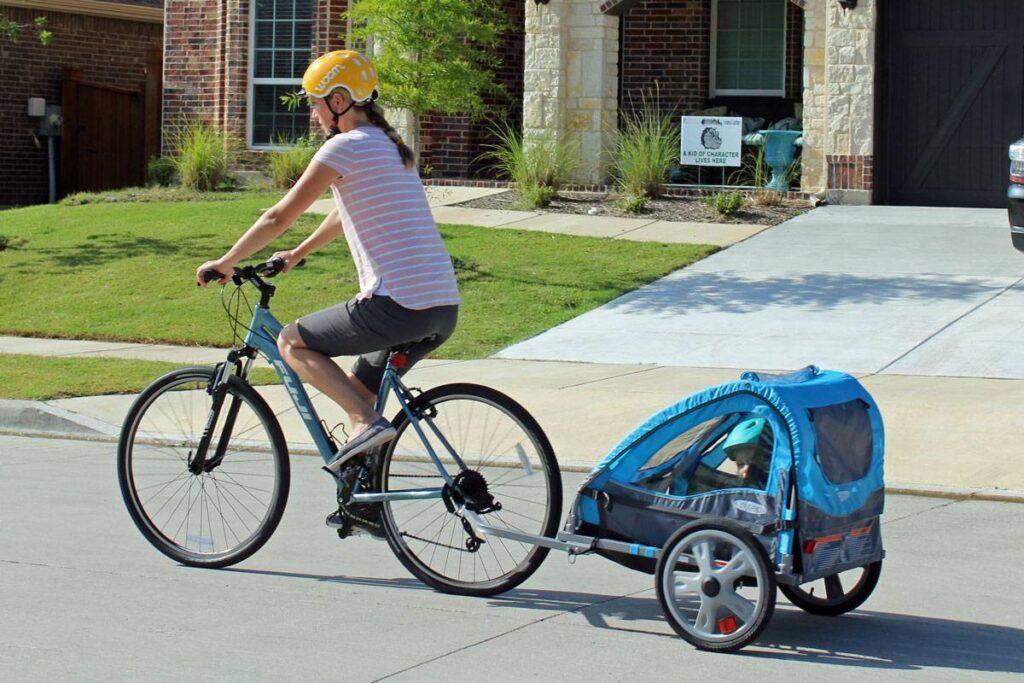
QUICK LOOK
InStep Bike Trailers

RATING: Recommended with Reservations
MSRP: $169 – $229
BEST FOR: Families on a tight budget who occasionally like to go on family bike rides.
TRAILER CAPACITY: Single or Double
TRAILER ARM: Included
JOGGER KIT: No
STROLLER KIT: Optional
PROS:
- Super affordable
- Available in single or double capacity
- Stroller upgrade available
- Spacious interior
- Pulls smoothly for a budget trailer
- Hitch is easy to use
CONS:
- 16″ wheels on plastic rims low-quality, can warp over time
- Exterior covers are thin and not durable
- Max speed of only 10 mph
- Lowest shoulder strap height too high for youngest riders
- Mesh helmet recess very high, not useful for most riders
InStep Bike Trailer Review – Results of our Test Rides
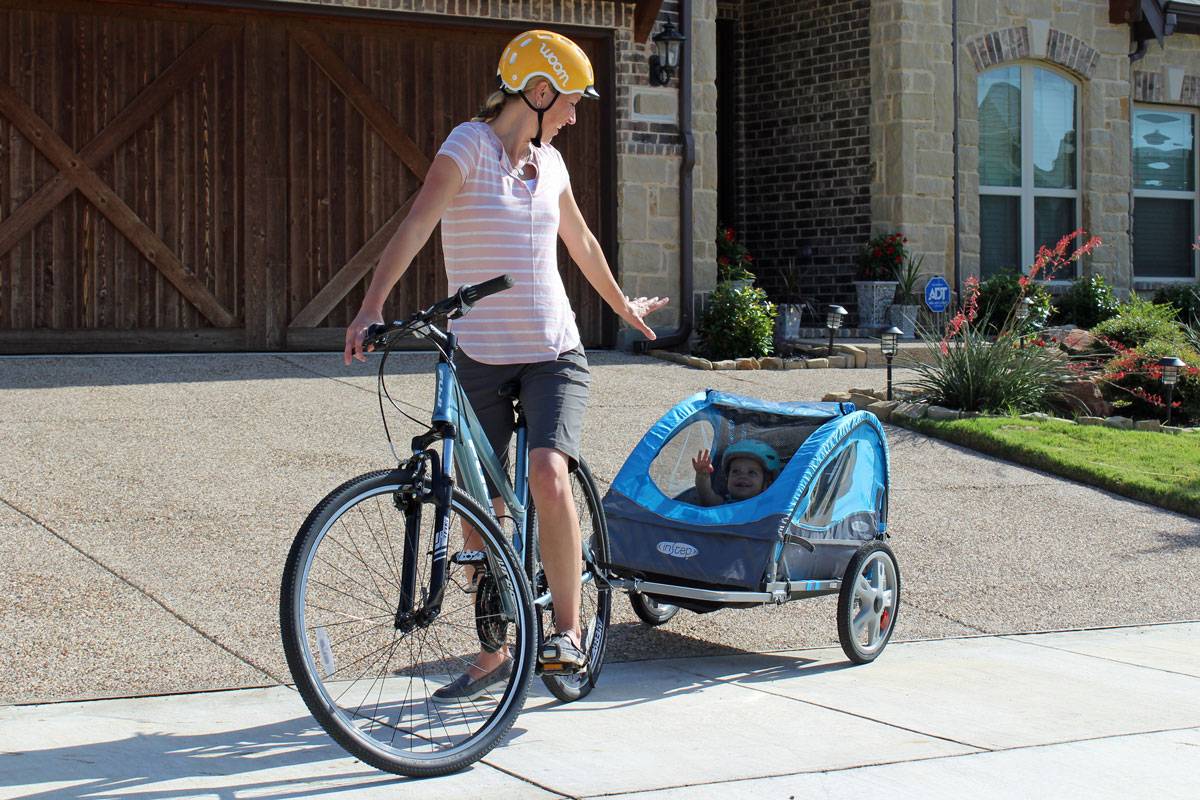
InStep bike trailers are insanely popular on Amazon. If you’re looking for a trailer without breaking the bank, InStep is a great option. But of course you want to get the most bang for your buck, right?
As with most bike-related purchases, you get what you pay for when it comes to bike trailers. So what’s the real difference between one of the Instep bike trailers and a slightly more expensive bike trailer like the Schwinn Echo or the Schwinn Trailblazer? And do those differences merit spending more money on the more expensive bike trailer? We outline their differences below so you can decide if a cheaper InStep is good enough for you, or if you really need that $300 Schwinn bike trailer.
InStep Bike Trailers – What’s the Difference?
InStep sells several different variations of their bike trailers, including double or single capacity as well as an optional stroller wheel to convert your trailer into a three-wheeled stroller. The stroller version is called the Quick-N-EZ or Sierra Double. We reviewed the double capacity, trailer-only InStep Take 2. (And the Sierra Double seems to have been discontinued.)
Here’s a quick chart to showcase the differences between the models of InStep bike trailers:
| InStep Take 2 | InStep Single | InStep Quick-N-EZ | InStep Sierra Double | |
| MSRP | $189 | $169 | $229 | $130 |
| Capacity | Double | Single | Double | Double |
| Trailer Type | Trailer only | Trailer only | Trailer + Stroller | Trailer + Stroller |
| Parking Brake | No | No | No | Yes |
| Seat Style | Hammock | Hammock | Hammock | Supportive Bench |
How Does the InStep Bike Trailer Ride?
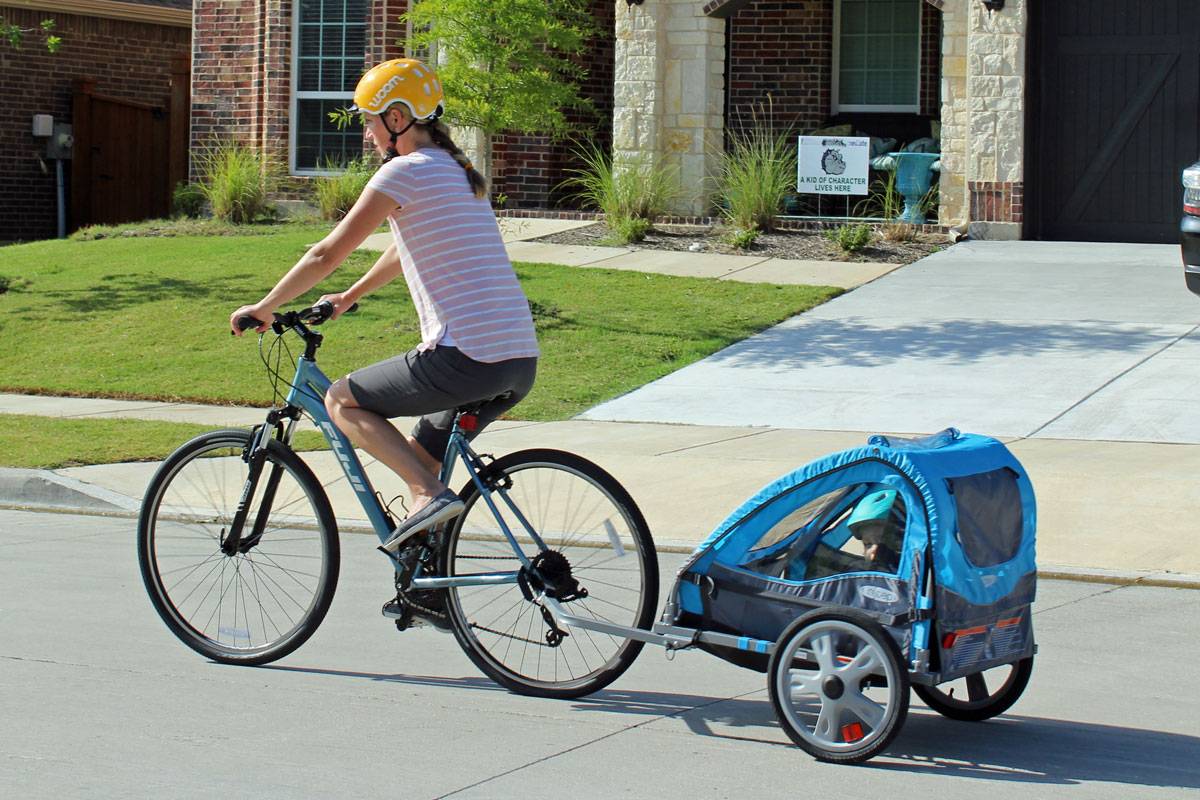
We were actually pretty surprised at the smoothness of the ride in the InStep Take 2. While certainly not as smooth as a Burley or Thule trailer, the InStep pulled well through our neighborhood with minimal rattling. From a kid’s perspective, because the seats aren’t reinforced, their bums sag and their weight can cause them to lean forward a bit.
Because the InStep has smaller 16″ wheels on plastic frames, the maximum recommended speed is just 10 mph. That may sound fast, but you can easily reach that speed going down even a gentle slope. At 10 mph, bumps are more pronounced.
The InStep is best limited to casual rides around the neighborhood or local paved trails where you won’t reach high speeds and your child won’t be subjected to bumpy terrain.
Interior Space
One place the InStep excels is in interior space. With 25″ of shoulder width and 26″ of seated height, it’s actually one of the most spacious trailers we’ve tested. While this is great for giving two kids more room to move around, it does make the trailer wider, which may or may not be a problem depending on the trails and turns you’re taking.
All InStep trailers have a maximum weight capacity of 80 lbs, with a maximum per child of 40 lbs. This weight capacity is what you’ll find on almost all bike trailers. Higher-end trailers usually have a weight capacity of 100 lbs., but that extra 20 lbs. is for cargo you might bring along.
Instep Take 2 vs. Schwinn Trailblazer

You’ll also notice that the shoulder straps are at their lowest setting in the InStep to properly fit both our 3-year-old and our very tall 20-month-old testers. While they fit them just fine, we would be more nervous placing a smaller child in the seat and securing them tightly. (Kids can technically start riding in a trailer at 12 months.)
Exterior Covers
The covers on the InStep bike trailers are identical and very basic. Low-quality nylon covers the sides and front of the trailer. The cover attaches with three pairs of snaps on the top, front, and back of the frame.
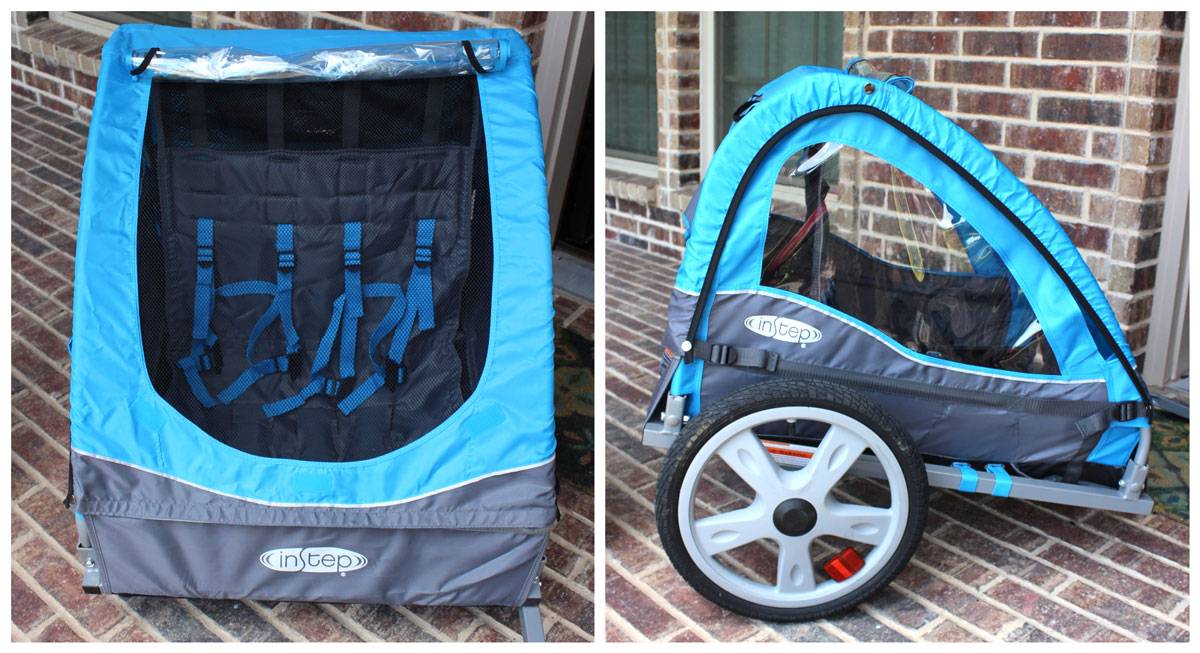
The snaps aren’t the best quality and are a bit difficult to secure. They’re also prone to coming undone – especially at the bottom – if you don’t have everything aligned just right. With the snaps in place, the bottom of the front cover secures in place with a long strip of velcro.
Overall, this system is not very convenient and also makes accessing kids in the trailer mid-ride a bit of a pain.
Although the InStep is incredibly easy to assemble out of the box, the basic frame and low-quality nylon cover lack durability and longevity. Even with minimal use on our part, the nylon is already starting to wear where it’s pulled tight against the frame.
There is also a small hole starting around one of the snaps on the trailer. The snap areas are reinforced on the reverse side with another layer of clear plastic, but will probably eventually tear at the seams. Having to pull tight on cheap, thin nylon is a recipe for rips.

Rain Cover
The InStep Take 2 has a clear plastic rain cover on the front that rolls up when not in use. The rear mesh opening doesn’t have a plastic cover, but does have a vinyl cover that will provide some protection from the weather.

Seats
The seat in the InStep trailers is hammock-style, which means that it is a piece of fabric pulled semi-taut on either side of the trailer. This a common style of seat for budget-friendly trailers, including the entry level trailers for Burley and Thule. The InStep Sierra Double is the only InStep trailer to offer more supportive bench-style seats.

There are however, better hammock seats than others. The InStep system has nylon straps under the seat that can be pulled to tighten and prevent sagging. While this is great in theory, this type of system doesn’t work well to actually prevent sagging.
In the image below, you can see just how far below the trailer our tester’s bum sagged beneath her weight in the InStep Take 2 vs in the Burley Bee.
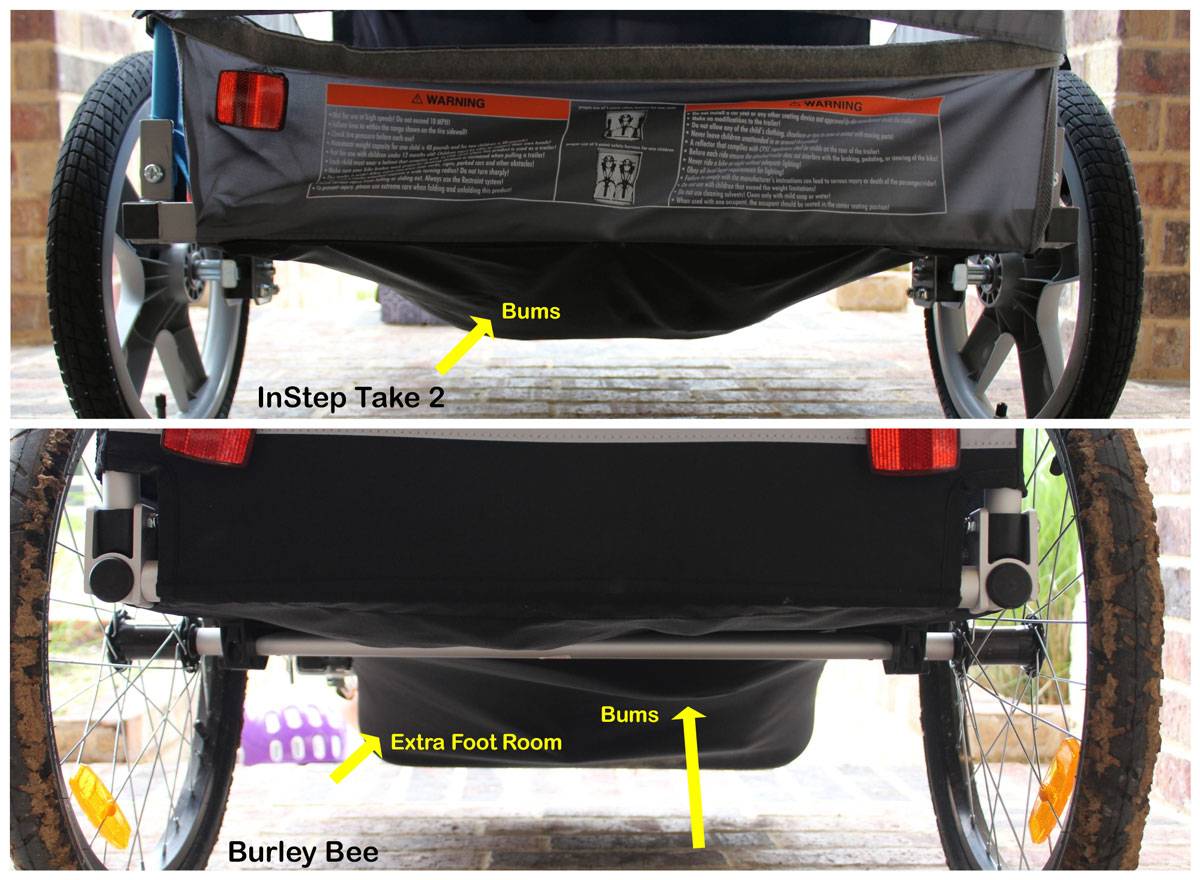
The bottom of the trailer has a little extra room for legs and feet, which is great, but it isn’t reinforced. Be careful having kids put their full weight on the bottom when getting in and out.
Mesh Helmet Recess
One feature of the InStep that is less than ideal is the mesh layer on the upper back of the seat. This mesh is loose and is meant to provide space for the back of a child’s helmet. This is meant to prevent a child’s head from being pushed forward uncomfortably.
Unfortunately, the helmet recess is so high up that it’s not very useful for most kids that will fit in the trailer. The InStep’s helmet pocket starts 15.5″ above the seat bottom, while the Schwinn Trailblazer’s starts 14″ above the seat. As a comparison, the Burley Bee’s mesh pocket starts just 10.5″ above the seat bottom.
Burley Bee’s Mesh Pocket Much Lower than InStep’s

Harness and Buckles
The harness and buckle system on the InStep bike trailers is basic and not the easiest to use. The strap tightness around the waist is a little difficult to get adjusted and the buckle insertions are a bit stiff and lack a clear “click” when inserted correctly. As a result, you’ll need to double check that the buckle has, in fact, fastened properly by tugging on the buckle.
Instep Trailer vs. Burley Buckle
I learned this lesson the hard way. My 18-month-old undid the buckle on her own at the end of our test ride, presumably because I thought the buckle had inserted all the way, but it hadn’t.
In general, harnesses tend to be more difficult to use with hammock-style seats because the child slides forward on the sagging seat while you’re trying to buckle them in. The child’s weight against the straps makes it harder to fasten them.
The height of the harness straps can be adjusted to accommodate kids of various sizes. The InStep has three slots for distinct height adjustments. This system works easily enough, but the plastic pieces you move into the slots to secure the strap in place aren’t actually held tight by anything on the back side.
While we had no issue with the safety of this system during our testing, it does give us pause that it’s possible for the top of the strap to be removed by an older child or to get ripped out of place in the event of a major crash.
Higher-end trailers, and even the budget Allen S2, have continuously adjustable straps that are on a sliding system to dial in the perfect fit for your child, no matter their size.
Burley Bee’s Adjustable Shoulder Height vs. InStep/Schwinn
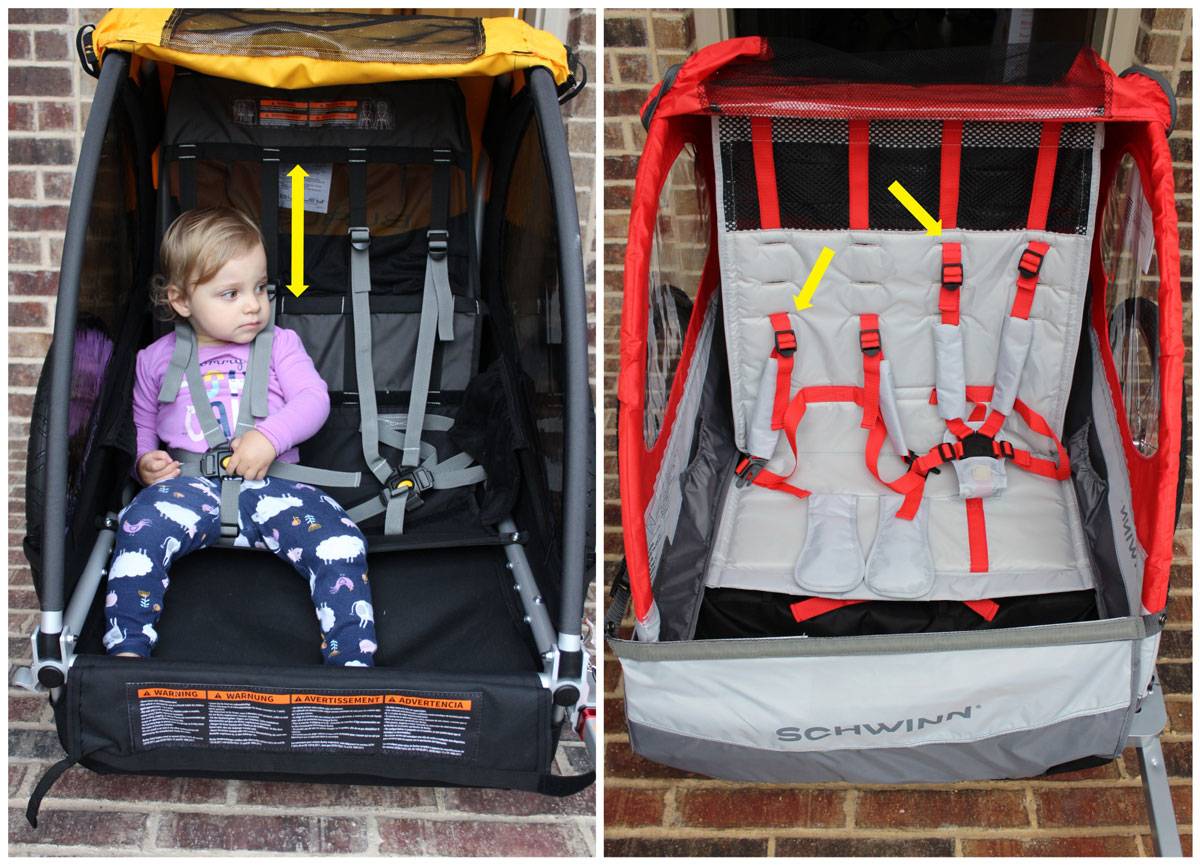
Wheels
What makes the InStep the most “budget” trailer of them all is the 16″ wheels on plastic rims. Almost all other trailers have metal rims and 20″ wheels, which are more durable and roll more smoothly. Although we haven’t experienced it personally, several reviewers on Amazon have commented that the tires sometimes pop off the plastic rims.
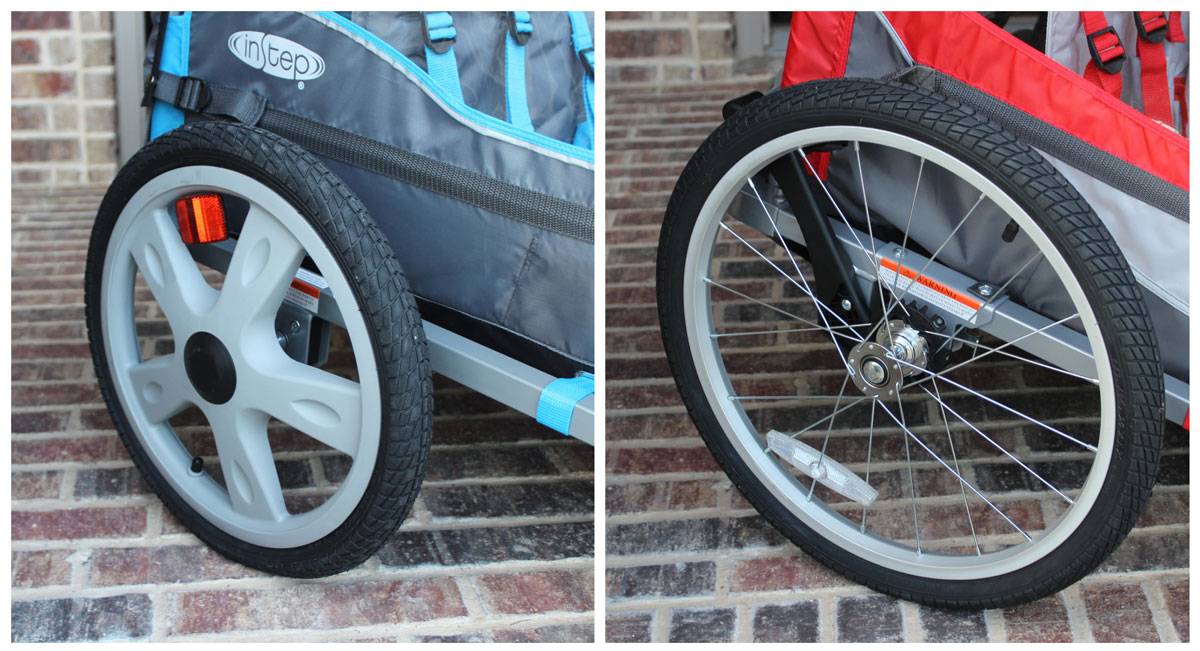
If you are going to be doing a decent amount of riding, 16″ wheels will quickly become problematic because you’re limited to just 10 mph, vs. 15 mph with higher-end 20″ wheels. (Schwinn bike trailers with 20″ wheels are also only safety rated to 10 mph, while trailers from Burley and Thule are safety rated to 15 mph).
Additionally, those plastic rims will not last as long as metal rims, so if you’re planning on using the trailer frequently and through several years or kids, the Schwinn Echo or the Trailblazer, or the Burley Bee would be a better option.
All this said, at least InStep can boast that it features air tires, unlike the super budget Schwinn Shuttle which has foam tires with no cushioning and very little traction.
Storage
The rear storage of the InStep is contained by a low-lying velcro enclosure that can come loose if not aligned perfectly. While handy for storing light items in a pinch, we wouldn’t recommend storing anything of value in there. The Schwinn trailers have the same system, which you can see below.
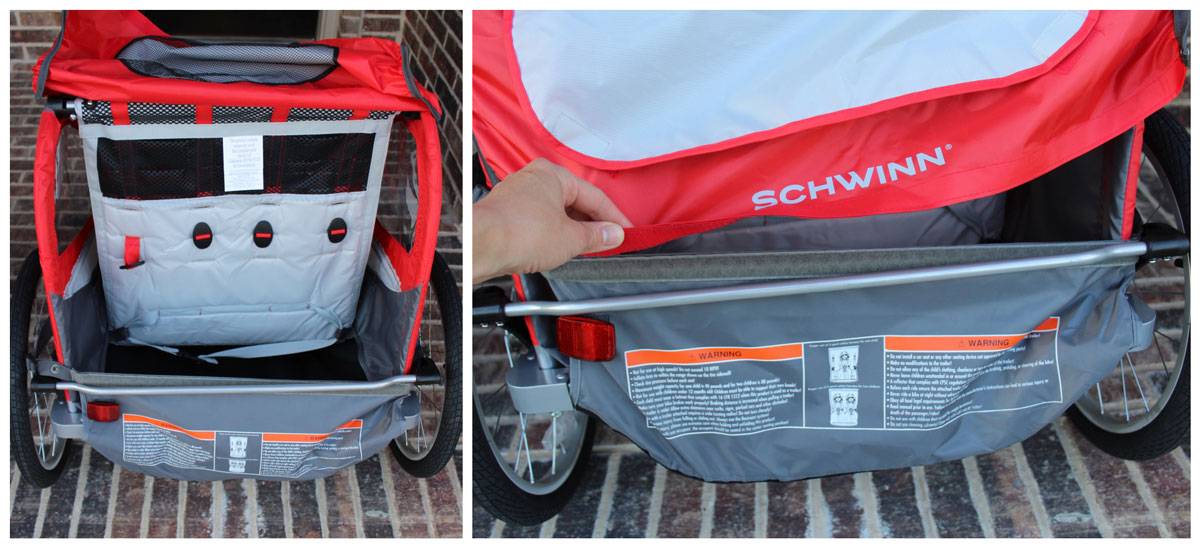
How to Attach an Instep Bike Trailer
The hitch and tow arm set up for the InStep bike trailers is identical. The tow arm fits easily inside the Instep bike trailer coupler attachment and secures with a pin, which attaches to the rear axle of the adult bike.
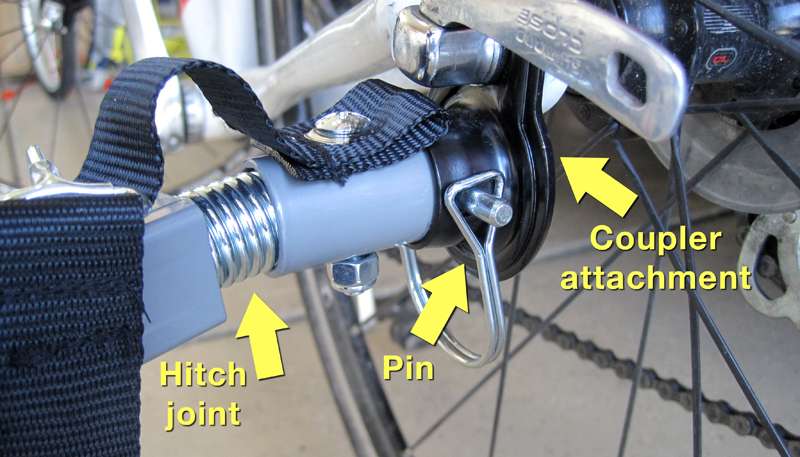
If you buy an additional coupler attachment, you can easily switch the trailer from one adult bike to another. The hitch joint is stiffer than higher-end trailers, but at slow, casual speeds, this shouldn’t matter. If you want to see the steps for how to hook up an InStep bike trailer, watch this quick video:
How to Fold an Instep Bike Trailer
If you want to fold your InStep Bike Trailer for more compact storage, or to put it in the car to transport to the trails, it’s super easy and takes just 4 simple steps:
- Fold and secure the trailer tow arm under the trailer by removing the retaining pin, folding the arm under the trailer, and reinserting the retaining pin to keep the arm secured in folded position
- Remove the top cross bar by pushing in on the black tabs from underneath, and then pulling up
- Collapse and fold the trailer sides
- Remove the wheels by pulling on the metal tab and pulling the wheels off
Assemble the trailer by doing these steps in reverse!
What Are You Missing With a Budget Trailer like the InStep?
We understand that shelling out over $350+ for a Burley, Thule Chariot, or Croozer trailer may not be ideal for your budget. If you only want to spend $100, get that InStep and enjoy the ride! We salute you for getting your little one out for a ride!
If you’re interested in understanding why other trailers cost so much more, here’s a quick snapshot of a few of the features you’ll get with a higher-end trailer that you won’t with an InStep bike trailer.
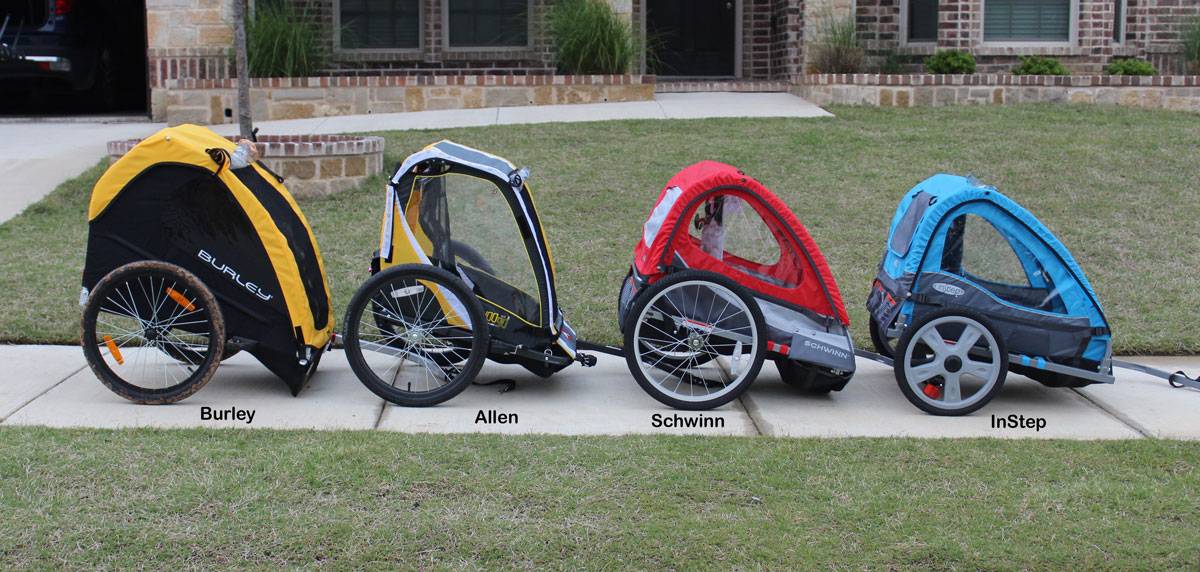
Child Comforts
- Padded and supported seats to prevent sagging and provide a more comfortable ride
- Additional padding along straps as well as for the back (standard on most high-end trailers)
- Helmet recess pocket (mesh pocket above the seats) to allow room for the back of a child’s helmet above the seats, versus having their helmet push their head forward when it makes contact with the seat
- Water-proof seams to keep kids dry if caught in the rain
- Ventilation throughout the cabin to provide additional airflow in hot weather and prevent the front plastic cover from fogging up in colder weather
- Suspension makes for a much smoother ride for little people, and less jostling for the towing adult
Overall Quality
- High-quality, easy-to-use mesh front covers with zippers, rather than Velcro or snaps
- A true footbrake that easily allows you to safely stop the stroller without bending down to place a strap around the wheel
- Wheel guards (small plastic bumpers that are installed in front of the tires) prevent the wheels from getting caught while riding, which is a potential safety hazard
- Replaceable parts: Most high-end trailers sell replacement parts in case something goes missing or breaks
- In general, the quality and durability of higher-end trailers is significantly better. In addition to being much easier to use, and they should last throughout all your children while maintaining a good resale value.
Conversion Kits and Upgrades
- Multiple height-adjust handlebars with various height settings versus two
- Stroller conversion kits turn your trailer into an exceptional weather-resistant stroller that provides a comfortable and safe place for kids
- Jogger conversions provide true multi-sport options, in addition to cross-country skiing kits
So what’s the bottom line on InStep trailers?
While families seem to love the InStep trailer, as evidenced by the many positive InStep Bike Trailer Reviews on Amazon, it does have its limitations. If you’re a family that will only be riding bike periodically and always on paved trails, the InStep is a really affordable way to give family bike riding a shot.
If you know you’ll be riding frequently, we highly recommend upgrading to a more functional and comfortable trailer, like the Burley Bee. You can see the Bee and other options on our page 10 Best Bike Trailers for Kids Guide.
Related Articles
10 Best Bike Trailers: For a quick look at our top picks for every budget.
FTC Disclosure: Affiliate links are included in this review. No monetary compensation was provided for this review, however, the reviewed product was supplied by the manufacturer or distributor to help facilitate this review. All opinions and images are that of Two Wheeling Tots LLC. All content and images are copyrighted and should not be used or replicated in any way. View ourTerms of Use.

